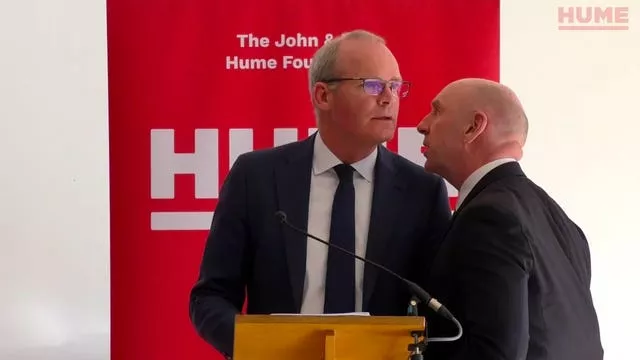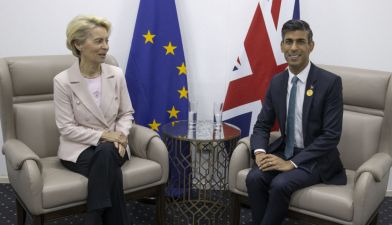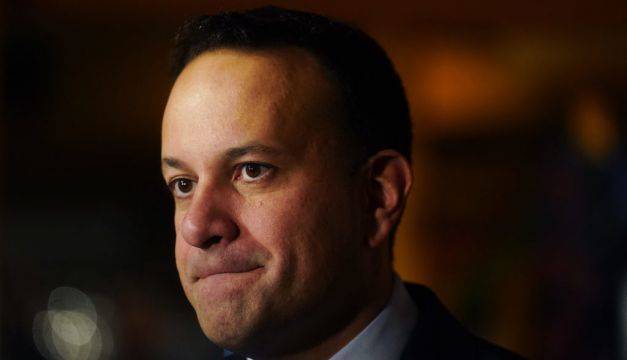Taoiseach Leo Varadkar has insisted any personal concerns over his safety will not deter him from visiting the North.
Mr Varadkar, who became Taoiseach for a second time last week, has become deeply unpopular within some sections of unionism and loyalism who claim he was an instrumental figure in the creation of the contentious Northern Ireland Protocol.
The Fine Gael leader said he aims to travel to Northern Ireland in the early new year as he signalled that resolving the impasse over the protocol is his priority.
Mr Varadkar’s name and image have appeared in threatening graffiti and posters in loyalist areas of Northern Ireland in recent times.
Earlier this month, posters using his face and a background image of loyalist bomb attacks in Dublin in 1974 warned of a potential return to violence.
In the summer an umbrella group representing loyalist paramilitaries said Irish Government ministers and officials were no longer welcome north of the Border.
In March, a peacebuilding event being addressed by then minister for foreign affairs Simon Coveney had to be evacuated due to a hoax bomb threat.

Speaking to reporters in Dublin on Friday, Mr Varadkar acknowledged there were concerns about him visiting the North in the current environment.
“Of course I have concerns, but I’m not going to allow any concerns about my personal safety to deter me from doing the job that I’m charged with doing and that is representing Ireland, representing the Irish Government, including in Northern Ireland,” he said.
“Obviously any security arrangements will be guided by the Garda Commissioner [Drew Harris] and also by the Police Service of Northern Ireland, and I will follow whatever protocols and whatever advice they suggest.”
Powersharing in Northern Ireland is in flux due to a DUP boycott of the Stormont institutions in protest over the protocol.
The region’s largest unionist party has insisted it will not return to devolved government unless radical changes are made to trading arrangements that have created economic barriers between Northern Ireland and Britain.
The EU and the UK are involved in negotiations to reduce the impact of the protocol. It remains to be seen if any deal struck by London and Brussels would be enough to convince the DUP to lift its block on powersharing.
The British and Irish governments are keen to see devolution return before April’s landmark 25th anniversary of Northern Ireland’s Good Friday peace agreement.
Mr Varadkar said resolving the dispute over the protocol was a “huge priority”.
“I’m keen to visit Northern Ireland, meet with parties in the early new year, I’m keen to speak to the prime minister [Rishi Sunak] as soon as possible and see if we can come to an agreement,” he said.
“I don’t think that an agreement on the protocol necessarily unlocks the Northern Ireland Assembly and Executive, but I do think that we will need an agreement on the protocol before that can be done.
“I’m very keen to make that happen. I think it’d be a real shame if we got to the 25th anniversary of the Good Friday Agreement next April and in a situation where we’re marking that but with no assembly, no executive, no powersharing up and running.
“So that’s obviously going to be a huge priority for me and the Tánaiste [Micheál Martin] in the weeks ahead.

“I hope that an agreement between the UK and the European Union on the protocol can unlock the institutions in Northern Ireland and get them up and running. But I’m not going to assume that’s the case.
“I think it won’t be possible to get the assembly and executive up and running again unless we have an agreement on the protocol. So that’s why it has to be a priority. It is a negotiation that’s handled by the European Union, including Ireland, on the one hand, and the UK on the other.

“I look forward to an early engagement with the prime minister and also with the [European] Commission president [Ursula von der Leyen] and the [European] Council president [Charles Michel] to talk about these matters, and I think it is possible to come to an agreement and I’m very keen that we do that, and certainly the European Union and the Irish Government will show flexibility in that regard.
“It’s in all of our interests that we come to an agreement.
“Britain and the European Union need to be standing together. We have other challenges in the world. And we need to make sure that we deal with this issue as soon as we possibly can.”







